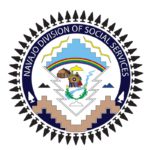NICWA Frequently Asked Questions
What does the Navajo Children and Family Services Program; Indian Child Welfare Act (ICWA) Unit provide as service?
- case management services
- consultation, collaboration and coordination with state child welfare agencies and courts
- education on cultural teachings, ICWA and Intergovernmental Agreement (IGA)
- advocate for Navajo children and their families
When does the Indian Child Welfare Act of 1978 Apply?
- When a child is dependent of state court.
- While a child is enrolled or eligible for enrollment in a Federally recognized tribe.
Does ICWA apply to Child Custody Cases?
- ICWA does not apply to Child Custody Dispute.
- (NOTE: Site Actual Law of 95-608)
What is Termination of Parental Rights?
A formal court proceeding to terminate the parental rights of parents to their children.
How do I begin the process?
- Complete and return the NCFS adoption application.
- Complete home study certification requirements which are outlined in the Adoption Unit section.
- Complete and return the NCFS adoption application.
- Complete home study certification requirements which are outlined in the Adoption Unit section.
- Does ICWA apply to Child Custody Cases?
- ICWA does not apply to Child Custody Dispute.
- (NOTE: Site Actual Law of 95-608)
- How do I begin the process?
- Complete and return the NCFS adoption application.
- Complete home study certification requirements which are outlined in the Adoption Unit section.
Can the Program help me adopt a relative child that is in my care?
“No, NCFS Adoption Unit does not facilitate privately arranged adoptions between relatives”.
Do I have to attend the two-day parenting training hosted by NCFS?
No, you can attend other trainings provided in your local area or on-line at: http://www.fosterparentcollege.com.
Will we meet the adoptive or relative children before placement?
Yes, during the transition phase, it is ideal to meet the child or children before placement is made. If the child’s adoption plan is through a voluntary relinquishment, the placement process may be quicker.
What involvement does the Birth Family have with the children after adoption takes places?
It depends on whether you have an open or close adoption.
Do I have to live on the reservation to adopt a child?
No, we certify enrolled Navajo families across the United States.
Who can adopt?
Eligible adults (age 18 years-old and over).
Will I get financial assistance when I adopt?
Explore this with your local child welfare resources, e.g. live on the Navajo reservation, IHS, DBHS, CHR, Chapter House, Head Start, etc.
What is the Indian Child Welfare Act of 1978?
“The Navajo Nation Indian Welfare Act found at 25 U.S.C. § 1901 et.seq. was enacted in 1978 to protect the interests of Indian families and the tribe’s interest in their children. The Act does not apply to domestic relations, criminal or most delinquency matters. ICWA does apply to delinquency matters where the minor has committed a status offense, an offense which cannot be committed by an adult, e.g., truancy, incorrigible behavior and the like, and to any juvenile delinquency proceeding that result in termination of a parental relationship.”
Who is the Indian Child?
The Indian Child means any unmarried person who is under age eighteen and is either (a) an enrolled member of an Indian tribe or (b) is eligible for membership/enrollment in an Indian tribe and is the biological child of an enrolled member of an Indian tribe.
(25 U.S.C. §1903, Definitions (4))
What does it mean when parents voluntarily relinquish their parental right to a child?
When parent(s) or legal guardians voluntarily consent to have their parental rights terminated.
How soon can I get a child placed in my home?
There is no timeline; it is on a case by case basis.
Once an Adoption is Granted and Finalized, is there any Monetary Assistance for the child adopted?
Children are determined eligible for Adoption Subsidies when they are initially placed in out-of-home care. Each child must meet the Federal Title IV-E requirements. For more information, please visit: http://www.fosteringconnections.org.
Do I have to get a Criminal Background Check done?
Yes, tribal, state and federal for all household members 18 years and older. It is a requirement; refer to the Adoption Unit section.
What would prevent me from getting certified to adopt?
- Felony convictions and other serious criminal charges.
- Failure to fulfill certification requirements.
After placement, what is the process for finalizing an adoption?
Contact an attorney for legal advice.
How much information will be given to the Adoptive Parents regarding birth family?
The Adoptive Parents will receive any and all pertinent information about the child that the agency has at the time of placement consideration.
Are there any costs involved with adoption through the NCFS Program?
Yes, the applicant is responsible for paying for their criminal background processing fee, attorney fees, travel expenses to meet child(ren), and some medical fees such as an physical examination.
Do I need a home with running water and electricity to adopt?
No, as long as you have a safe, stable, and permanent structured home.
Are there services provided after adoption is finalized?
Explore this with your local child welfare resources, e.g. live on Navajo reservation, IHS, DBHS, CHR, Chapter House, Head Start, etc..
